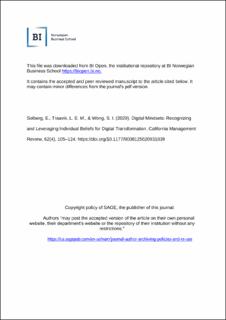| dc.contributor.author | Solberg, Elizabeth | |
| dc.contributor.author | Traavik, Laura E. Mercer | |
| dc.contributor.author | Wong, Sut I | |
| dc.date.accessioned | 2022-04-04T10:36:15Z | |
| dc.date.available | 2022-04-04T10:36:15Z | |
| dc.date.created | 2020-06-08T16:51:16Z | |
| dc.date.issued | 2020 | |
| dc.identifier.citation | California Management Review. 2020, 62 (4), 105-124. | en_US |
| dc.identifier.issn | 0008-1256 | |
| dc.identifier.uri | https://hdl.handle.net/11250/2989525 | |
| dc.description.abstract | Employees’ beliefs about technological change, their “digital mindsets,” are likely to influence their engagement in, or withdrawal from, their company’s digital transformation initiatives. Employees’ beliefs regarding the malleability of personal ability (fixed/growth mindset) and their beliefs about the availability of situational resources (zero-sum/expandable-sum mindset) influence the extent to which they see new technologies as providing opportunities for professional growth or as encroaching on their ability to display competency. This article examines the implications for managing digital transformation. | en_US |
| dc.language.iso | eng | en_US |
| dc.publisher | Sage | en_US |
| dc.subject | Adaptive leadership | en_US |
| dc.subject | Change management | en_US |
| dc.subject | Cognitive framing | en_US |
| dc.subject | Employee beliefs | en_US |
| dc.subject | Technology acceptance | en_US |
| dc.title | Digital Mindsets: Recognizing and Leveraging Individual Beliefs for Digital Transformation | en_US |
| dc.type | Journal article | en_US |
| dc.type | Peer reviewed | en_US |
| dc.description.version | acceptedVersion | en_US |
| dc.rights.holder | Sage | en_US |
| dc.source.pagenumber | 105-124 | en_US |
| dc.source.volume | 62 | en_US |
| dc.source.journal | California Management Review | en_US |
| dc.source.issue | 4 | en_US |
| dc.identifier.doi | 10.1177/0008125620931839 | |
| dc.identifier.cristin | 1814430 | |
| dc.relation.project | Norges forskningsråd: Research Council of Norway (RCN) 275347 | en_US |
| cristin.ispublished | true | |
| cristin.fulltext | postprint | |
| cristin.qualitycode | 1 | |
